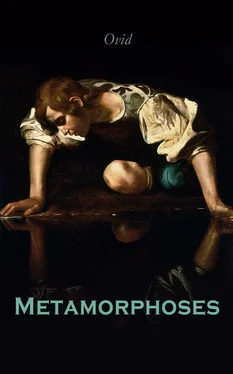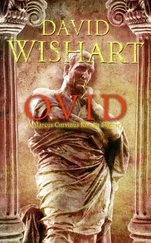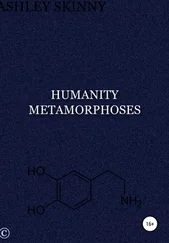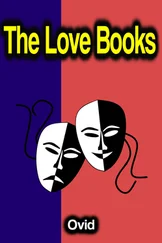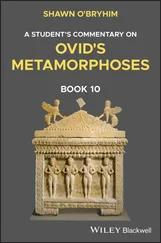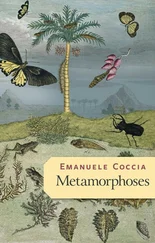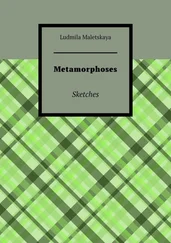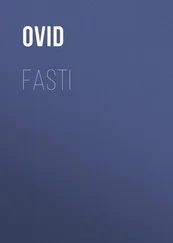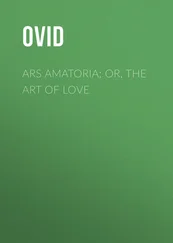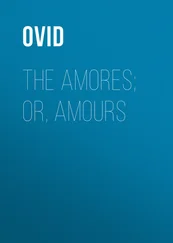Ovid - Metamorphoses
Здесь есть возможность читать онлайн «Ovid - Metamorphoses» — ознакомительный отрывок электронной книги совершенно бесплатно, а после прочтения отрывка купить полную версию. В некоторых случаях можно слушать аудио, скачать через торрент в формате fb2 и присутствует краткое содержание. Жанр: unrecognised, на английском языке. Описание произведения, (предисловие) а так же отзывы посетителей доступны на портале библиотеки ЛибКат.
- Название:Metamorphoses
- Автор:
- Жанр:
- Год:неизвестен
- ISBN:нет данных
- Рейтинг книги:3 / 5. Голосов: 1
-
Избранное:Добавить в избранное
- Отзывы:
-
Ваша оценка:
- 60
- 1
- 2
- 3
- 4
- 5
Metamorphoses: краткое содержание, описание и аннотация
Предлагаем к чтению аннотацию, описание, краткое содержание или предисловие (зависит от того, что написал сам автор книги «Metamorphoses»). Если вы не нашли необходимую информацию о книге — напишите в комментариях, мы постараемся отыскать её.
Metamorphoses — читать онлайн ознакомительный отрывок
Ниже представлен текст книги, разбитый по страницам. Система сохранения места последней прочитанной страницы, позволяет с удобством читать онлайн бесплатно книгу «Metamorphoses», без необходимости каждый раз заново искать на чём Вы остановились. Поставьте закладку, и сможете в любой момент перейти на страницу, на которой закончили чтение.
Интервал:
Закладка:
While the conqueror was surveying the vast size of his vanquished enemy, a voice was suddenly heard (nor was it easy to understand whence it was , but heard it was). “Why, son of Agenor, art thou thus contemplating the dragon slain by thee ? Even thou thyself shalt be seen in the form of a dragon.” 10He, for a long time in alarm, lost his color together with his presence of mind, and his hair stood on end with a chill of terror. Lo! Pallas, the favorer of the hero, descending through the upper region of the air, comes to him, and bids him sow the dragon’s teeth under the earth turned up, as the seeds of a future people. He obeyed; and when he had opened a furrow with the pressed plough, he scattered the teeth on the ground as ordered, the seed of a race of men. Afterwards (’tis beyond belief) the turf began to move, and first appeared a point of a spear out of the furrows, next the coverings of heads nodding with painted cones; 11then the shoulders and the breast, and the arms laden with weapons start up, and a crop of men armed with shields grows apace. So, when the curtains 12are drawn up in the joyful theaters, figures are wont to rise, and first to show their countenances; by degrees the rest; and being drawn out in a gradual continuation, the whole appear, and place their feet on the lowest edge of the stage . Alarmed with this new enemy, Cadmus is preparing to take arms, when one of the people that the earth had produced cries out, “Do not take up arms , nor engage thyself in civil war.” And then, engaged hand to hand, he strikes one of his earth-born brothers with the cruel sword, while he himself falls by a dart sent from a distance. He, also, who had put him to death, lives no longer than the other, and breathes forth the air which he has so lately received. In a similar manner, too, the whole troop becomes maddened, and the brothers so newly sprung up, fall in fight with each other, by mutual wounds. And now the youths that had the space of so short an existence allotted them, beat with throbbing breast their blood-stained mother, five only remaining, of whom Echion 13was one. He, by the advice of Tritonia, threw his arms upon the ground, and both asked and gave the assurance of brotherly concord.
The Sidonian stranger had these as associates in his task, when he built the city that was ordered by the oracle of Phœbus.
EXPLANATION.
Agenor, on losing his daughter, commands his sons to go in search of her, and not to return till they have found her. The young princes, either unable to learn what was become of her, or, perhaps, being too weak to recover her out of the hands of the king of Crete, did not return to their father, but established themselves in different countries; Cadmus settling in Bœotia, Cilix in Cilicia, to which he gave his name, and Phœnix, as Hyginus tells us, remaining in Africa. Photius, quoting from Conon, the historian, informs us, that the hope of conquering some country in Europe, and establishing a colony there, was the true ground of the voyage of Cadmus.
Palæphatus, and other writers, say, that the Dragon which was killed by Cadmus was a king of the country, who was named Draco, and was a son of Mars: that his teeth were his subjects, who rallied again after their defeat, and that Cadmus put them all to the sword, except Chthonius, Udeus, Hyperenor, Pelor, and Echion, who became reconciled to him. Heraclitus, however, assures us, that Cadmus really did slay a serpent, which was very annoying to the Bœotian territory. Bochart and Le Clerc are of opinion that the Fable has the following foundation:—They say, that in the Phœnician language, the same word signifies either the teeth of a serpent, or short javelins, pointed with brass; that the word which signifies the number five likewise means an army; and that probably, from these circumstances, the Fable may have taken its rise. For the Greeks, in following the annals written in the Phœnician language, while writing the history of the founder of Thebes, instead of describing his soldiers as wearing helmets on their heads, with back and breast-plates, and with darts in their III. 131-132 hands pointed with brass, which equipment was then entirely novel in Greece, chose rather to follow the more wonderful version, and to say, that Cadmus had five companions produced from the teeth of a serpent; as, according to Bochart’s suggestion, the same Phœnician phrase may either signify a company of men sprung from the teeth of a serpent, or a company of men armed with brazen darts.
This conjecture is, perhaps, confirmed by a story related by Herodotus (book ii.), which resembles it very much. He tells us, that Psammeticus, king of Egypt, being driven to the marshy parts of his kingdom, sent to consult the oracle of Latona, which answered that he should be restored by brass men coming from the sea. At the time, this answer appeared to him entirely frivolous; but certain Ionian soldiers, being obliged, some years after, to retire to Egypt, and appearing on the shore with their weapons and armor, all of brass, those who perceived them ran immediately to inform the king, that men clad in brass were plundering the country. The prince then fully comprehended the meaning of the oracle, and making an alliance with them, recovered his throne by the assistance they gave him. These brass men come from the sea, and those sprung from the earth were soldiers who assisted Psammeticus and Cadmus in carrying out their objects. Bochart’s conjecture is strengthened by the fact, that Cadmus was either the inventor of the cuirass and javelin, or the first that brought them into Greece. Without inquiring further into the subject, we may conclude, that the men sprung from the earth, or the dragon’s teeth which were sown, were the people of the country, whom Cadmus found means to bring over to his interest; and that they first helped him to conquer his enemies, and then to build the citadel of Thebes, to ensure his future security. Apollodorus says that Cadmus, to expiate the slaughter of the dragon, was obliged to serve Mars a whole year; which year, containing eight of our years, it is not improbable that Cadmus rendered services for a long time to his new allies before he received any assistance from them.
FABLE III.
Actæon, the grandson of Cadmus, fatigued with hunting and excessive heat, inadvertently wanders to the cool valley of Gargaphie, the usual retreat of Diana, when tired with the same exercise. There, to his misfortune, he surprises the Goddess and her Nymphs while bathing, for which she transforms him into a stag, and his own hounds tear him to pieces.
And now Thebes was standing; now Cadmus, thou mightst seem happy in thy exile. Both Mars and Venus 14had become thy father-in-law and mother-in-law; add to this, issue by a wife so illustrious, so many sons 15and daughters, and grandchildren, dear pledges of love ; these, too, now of a youthful age. But, forsooth, the last day of life must always be awaited by man, and no one ought to be pronounced happy before his death, 16and his last obsequies. Thy grandson, Cadmus, was the first occasion of sorrow to thee, among so much prosperity, the horns, too, not his own, placed upon his forehead, and you, O dogs, glutted with the blood of your master. But, if you diligently inquire into his case , you will find the fault of an accident, and not criminality in him; for what criminality did mistake embrace?
There was a mountain stained with the blood of various wild beasts; and now the day had contracted the meridian shadow of things, and the sun was equally distant from each extremity of the heavens ; when the Hyantian youth 17 thus addressed the partakers of his toils, as they wandered along the lonely haunts of the wild beasts , with gentle accent: “Our nets are moistened, my friends, and our spears, too, with the blood of wild beasts; and the day has yielded sufficient sport; when the next morn, borne upon her rosy chariot, shall bring back the light, let us seek again our proposed task. Now Phœbus is at the same distance from both lands, the Eastern and the Western , and is cleaving the fields with his heat. Cease your present toils, and take away the knotted nets.” The men execute his orders, and cease their labors. There was a valley, thick set with pitch-trees and the sharp-pointed cypress; by name Gargaphie, 18sacred to the active Diana. In the extreme recess of this, there was a grotto in a grove, formed by no art; nature, by her ingenuity, had counterfeited art; for she had formed a natural arch, in the native pumice and the light sand-stones. A limpid fountain ran murmuring on the right hand with its little stream, having its spreading channels edged with a border of grass. Here, when wearied with hunting, the Goddess of the woods was wont to bathe her virgin limbs in clear water.
Читать дальшеИнтервал:
Закладка:
Похожие книги на «Metamorphoses»
Представляем Вашему вниманию похожие книги на «Metamorphoses» списком для выбора. Мы отобрали схожую по названию и смыслу литературу в надежде предоставить читателям больше вариантов отыскать новые, интересные, ещё непрочитанные произведения.
Обсуждение, отзывы о книге «Metamorphoses» и просто собственные мнения читателей. Оставьте ваши комментарии, напишите, что Вы думаете о произведении, его смысле или главных героях. Укажите что конкретно понравилось, а что нет, и почему Вы так считаете.
